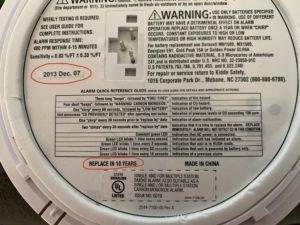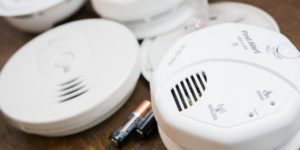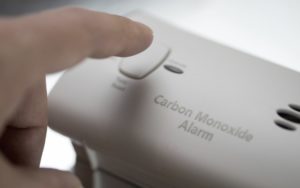As the home-heating season arrives in Texas, I want to share some home safety tips that can help to keep your family safe from the dangers of fires and carbon monoxide poisoning. Since the winter months create greater fire and carbon monoxide dangers in our home, this is a great time for a few reminders about these dangers.
According to a report by the National Fire Protection Association, (NFPA), 56% of all home fire fatalities in the United States occur during the five months of November through March. This means that during the five coldest months of the year, the number of fatalities is 78% higher than during the other seven months of the year.
In a study conducted by the Centers for Disease Control (CDC), 36% of carbon monoxide deaths occurred in the months of December, January, and February. That is a rate that is almost 70% higher than the other nine months of the year.
Homes are Much Safer with Smoke Alarms
According to another report by the National Fire Protection Association, (NFPA), three out of every five fatalities due to home fires occurred in a home where there was either no smoke alarm or where there were no working smoke alarms. This same study also found that the death rate per 1000 reported home fires was twice as high if there was no working smoke detector in the home.
These statistics tell you that if there is a fire in your home, your odds of survival are significantly greater if your home has working smoke detectors.
How Long do Smoke Detectors Last?
 Smoke detectors do not last forever. The sensors in them wear out and become ineffective over time. Smoke detectors only last for about eight to ten years so if you have lived in your home for eight years or more and have never replaced your smoke detectors, then it is time to replace them. How long has it been since you’ve replaced the smoke detectors in your home?
Smoke detectors do not last forever. The sensors in them wear out and become ineffective over time. Smoke detectors only last for about eight to ten years so if you have lived in your home for eight years or more and have never replaced your smoke detectors, then it is time to replace them. How long has it been since you’ve replaced the smoke detectors in your home?
If you have lived in your home for less than eight years and you don’t know how old the smoke detectors are, then I highly recommend that you take each one of them down and look for the manufacturing date on the back to determine their age. If they are eight years old or more, or even if they are close to eight years old, then it would be a very good idea to replace them.
Smoke detectors only last for about eight to ten years.
Why Do Smoke Detectors Chirp or Beep?
A smoke detector beeps or chirps to indicate that the battery is getting weak. Even smoke detectors that are hardwired have a backup battery. The battery will ensure that the hardwired smoke detector will continue to work and protect your family even if electrical power is interrupted for some reason. Electrical power is often interrupted when there is a fire in the home. When this backup battery gets weak, the smoke detector will begin to chirp to alert you of this fact.
DO NOT simply remove the battery when a smoke detector chirps. REPLACE the battery. The safety of your family depends on it.
Smoke Detector Maintenance
Although smoke detectors require very little maintenance, there are a couple of things that you can do to help to keep them working properly.
 1. Replace the battery at least once a year. There is nothing more annoying than a smoke detector chirping or beeping – especially at night. If you are like some many people, you may have pulled that battery out of the smoke detector to get rid of that annoying noise. This is not a smart thing to do as it increases the danger to your family if there is ever a fire in your home.
1. Replace the battery at least once a year. There is nothing more annoying than a smoke detector chirping or beeping – especially at night. If you are like some many people, you may have pulled that battery out of the smoke detector to get rid of that annoying noise. This is not a smart thing to do as it increases the danger to your family if there is ever a fire in your home.
If you will replace the batteries in every smoke detector in your home, you will probably never have to worry a smoke detector beeping in the middle of the night again. More importantly, you can sleep well at night, knowing that you and your family will be woken up in the middle of the night (or alerted during the day) should there ever be a fire in your home.
2. Run the vacuum hose over each smoke detector at least once a year. Dirt buildup on the sensors on some smoke alarms can prevent them from working properly, so a quick cleaning with a vacuum can help to ensure that each smoke detector will be able to work properly if necessary to alert your family in the event of a fire.
Keeping Your Family Safe from Carbon Monoxide
 Carbon monoxide is the silent, odorless, tasteless, and invisible killer. The Centers for Disease Control and Prevention (CDC) reports that more than 400 Americans die from unintentional CO poisoning not linked to fires every year. Also, more than 20,000 visit the emergency room, and about 4,000 people are hospitalized. By ensuring that your home has one or more working CO detectors, you can greatly minimize the chance that this poison will cause a tragedy in your home.
Carbon monoxide is the silent, odorless, tasteless, and invisible killer. The Centers for Disease Control and Prevention (CDC) reports that more than 400 Americans die from unintentional CO poisoning not linked to fires every year. Also, more than 20,000 visit the emergency room, and about 4,000 people are hospitalized. By ensuring that your home has one or more working CO detectors, you can greatly minimize the chance that this poison will cause a tragedy in your home.
How Long do Carbon Monoxide Detectors Last?
According to ProTech Security (https://protechsecurity.com/how-long-do-smoke-and-carbon-monoxide-detectors-last/), carbon monoxide detectors only last for five to seven years. It would be wise to replace the carbon monoxide detectors in your home every five years. If you don’t know how old the carbon monoxide detector in your home is, and you can’t find a date on it, then I would highly recommend replacing it.
Just like your smoke detectors, your carbon monoxide detectors need to have the batteries replace yearly. It would be a good habit to simply replace the batteries in all smoke and carbon monoxide detectors at the same time.
What are the Main Sources of Carbon Monoxide in the Home?
Carbon monoxide is a potential risk wherever fuel burns. These sources include the following:
- Furnace
- Chimney
- Fireplace
- Water heater
- Gas stove/oven
- Gas-powered space heaters
- Clothes dryer
- Grill
- Power tools and lawn equipment
- An attached garage that regularly houses vehicles
Steps to Protect Yourself from the Dangers of Carbon Monoxide
- Have all fuel-burning appliances, furnaces, venting and chimney systems checked at the beginning of each heating season to make sure that they are functioning and exhausting properly.
- Never use your stove or oven to help heat your home, and NEVER use a charcoal grill in your home or garage.
- Never keep a car running in a garage. Even with the garage doors open, normal circulation will not normally provide enough fresh air to prevent a dangerous buildup of CO.
- When purchasing an existing home, have a qualified technician evaluate the heating and cooking systems to ensure that they are operating properly.
- Have a family discussion about safety in general, and be sure to include what to do in the event that your carbon monoxide detector sounds.
Summary
From the information cited above, I think it is clear that many of the deaths related to fires and carbon monoxide posisoning could have been prevented simply by having working smoke and CO detectors in the homes where the fatalites occurred. This shows the importance of maintaining the smoke detectors and carbon monoxide detectors in good working condition. By spending just a few dollars and a few minutes every year, you can significantly increase the safety of your family. What better time than now to check out the smoke and CO detectors in your home to see if they need to be replaced, and to ensure that they have fresh batteries?
Check out other blogs on Carbon Monoxide and Smoke Detectors.
© 2020 Mike Morgan
This article was written by Mike Morgan, the owner of Morgan Inspection Services. Morgan Inspection Services has been providing home, septic and well inspection services throughout the central Texas area since 2002. He can be reached at 325-998-4663 or at mike@morganinspectionservices.com. No article, or portion thereof, may be reproduced or copied without prior written consent of Mike Morgan.

